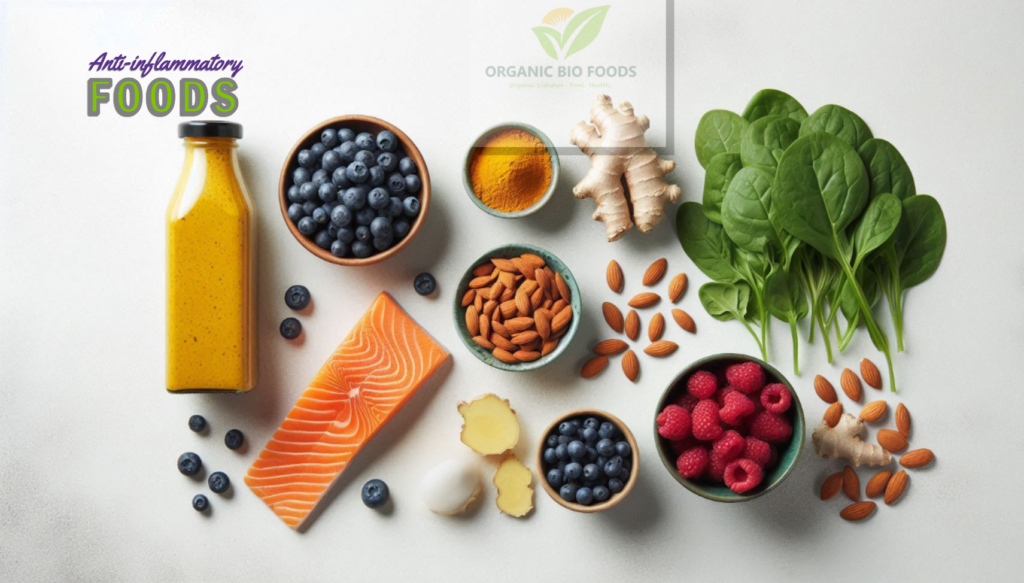Inflammation is the body’s natural response to injury or illness, but when it becomes chronic, it can lead to a host of health problems, including heart disease, arthritis, diabetes, and even certain cancers. Fortunately, one of the most effective ways to combat chronic inflammation is through your diet. Incorporating natural anti-inflammatory foods into your daily meals can help reduce inflammation and promote overall health. We have listed out six anti-inflammatory foods you should consider eating daily and they matter.
- Turmeric
Turmeric is a powerful spice that has been used for centuries in traditional medicine, particularly in Ayurvedic practices. The active compound in turmeric, curcumin, is known for its potent anti-inflammatory and antioxidant properties.
Why You Should Eat It:
Reduces Inflammation: Curcumin inhibits several molecules that play a role in inflammation, making it effective in reducing chronic inflammatory conditions like arthritis and inflammatory bowel disease.
Boosts Immune System: Turmeric enhances the body’s antioxidant capacity, helping to protect against damage from free radicals, which can lead to inflammation.
How to Incorporate It into your diet plan:
Add turmeric to your daily meals by sprinkling it on roasted vegetables, mixing it into soups, or adding a dash to your morning smoothie. For optimal absorption, pair it with black pepper, which enhances curcumin’s bioavailability.
- Berries
Berries such as blueberries, strawberries, raspberries, and blackberries are rich in antioxidants, particularly anthocyanins, which give them their vibrant color. These compounds have strong anti-inflammatory effects.
Why You Should Eat Them:
Reduces Oxidative Stress: The antioxidants in berries help neutralize free radicals, reducing oxidative stress and inflammation in the body.
Supports Heart Health: Regular consumption of berries has been linked to lower levels of inflammatory markers and a reduced risk of heart disease.
How to Incorporate Them in Your Diet Plan:
Enjoy a handful of berries as a snack, add them to your morning oatmeal, blend them into a smoothie, or use them as a topping for yogurt or salads.
- Fatty Fish
Fatty fish such as salmon, mackerel, sardines, and tuna are excellent sources of omega-3 fatty acids, which are known for their powerful anti-inflammatory effects.
Why You Should Eat It:
Reduces Inflammatory Markers: Omega-3 fatty acids, particularly EPA and DHA, helps reduce the production of inflammatory molecules and markers in the body, such as cytokines and eicosanoids.
Supports Brain and Heart Health: Regular consumption of fatty fish is associated with lower risks of chronic diseases like heart disease and Alzheimer’s due to its anti-inflammatory properties.
How to Incorporate Them in Your Diet Plan:
Aim to eat fatty fish at least twice a week. Grill or bake salmon for dinner, add sardines to your salad, or enjoy a tuna sandwich on whole-grain bread.
- Leafy Greens
Leafy greens like spinach, kale, and Swiss chard are packed with vitamins, minerals, and antioxidants that have anti-inflammatory effects. They are also high in fiber, which supports digestive health.
Why You Should Eat Them:
High in Antioxidants: Leafy greens are rich in antioxidants like vitamins A, C, and K, which help combat inflammation and protect against cellular damage.
Supports Detoxification: These greens contain chlorophyll, which helps detoxify the body and reduce inflammation caused by environmental toxins.
How to Incorporate Them in Your Diet Plan:
Incorporate leafy greens into your diet by adding them to salads, blending them into smoothies, sautéing them with garlic and olive oil, or adding them to soups and stews.
- Ginger
Ginger is a well-known natural remedy for various ailments, including nausea and digestive issues. It also has powerful anti-inflammatory and antioxidant properties, thanks to compounds like gingerol.
Why You Should Eat It:
Reduces Inflammatory Responses: Ginger has been shown to reduce inflammation in the body by inhibiting the production of pro-inflammatory cytokines.
Eases Joint Pain: The anti-inflammatory properties of ginger make it particularly beneficial for people with osteoarthritis and rheumatoid arthritis.
How to Incorporate Them in Your Diet Plan:
Add fresh or powdered ginger to your diet by steeping it in hot water for tea, grating it into stir-fries, adding it to smoothies, or using it in marinades for meat and fish.
- Nuts and Seeds
Nuts and seeds, particularly almonds, walnuts, flaxseeds, and chia seeds, are excellent sources of healthy fats, fiber, and antioxidants. They are also rich in omega-3 fatty acids, which help fight inflammation.
Why You Should Eat Them:
Reduces Inflammatory Markers: The omega-3 fatty acids and antioxidants in nuts and seeds help lower levels of inflammation and improve overall heart health.
Supports Gut Health: The fiber content in nuts and seeds promotes healthy digestion and supports a balanced gut microbiome, which plays a crucial role in managing inflammation.
How to Incorporate Them in Your Diet Plan:
Snack on a handful of nuts, sprinkle seeds on your salads or yogurt, blend them into smoothies, or use them as a topping for oatmeal or baked goods.
Overall, while diet plays a crucial role in managing inflammation, it’s also important to maintain a healthy lifestyle that includes regular exercise, adequate sleep, and stress management. Combining these practices with a diet rich in anti-inflammatory foods will help you achieve optimal health and well-being








